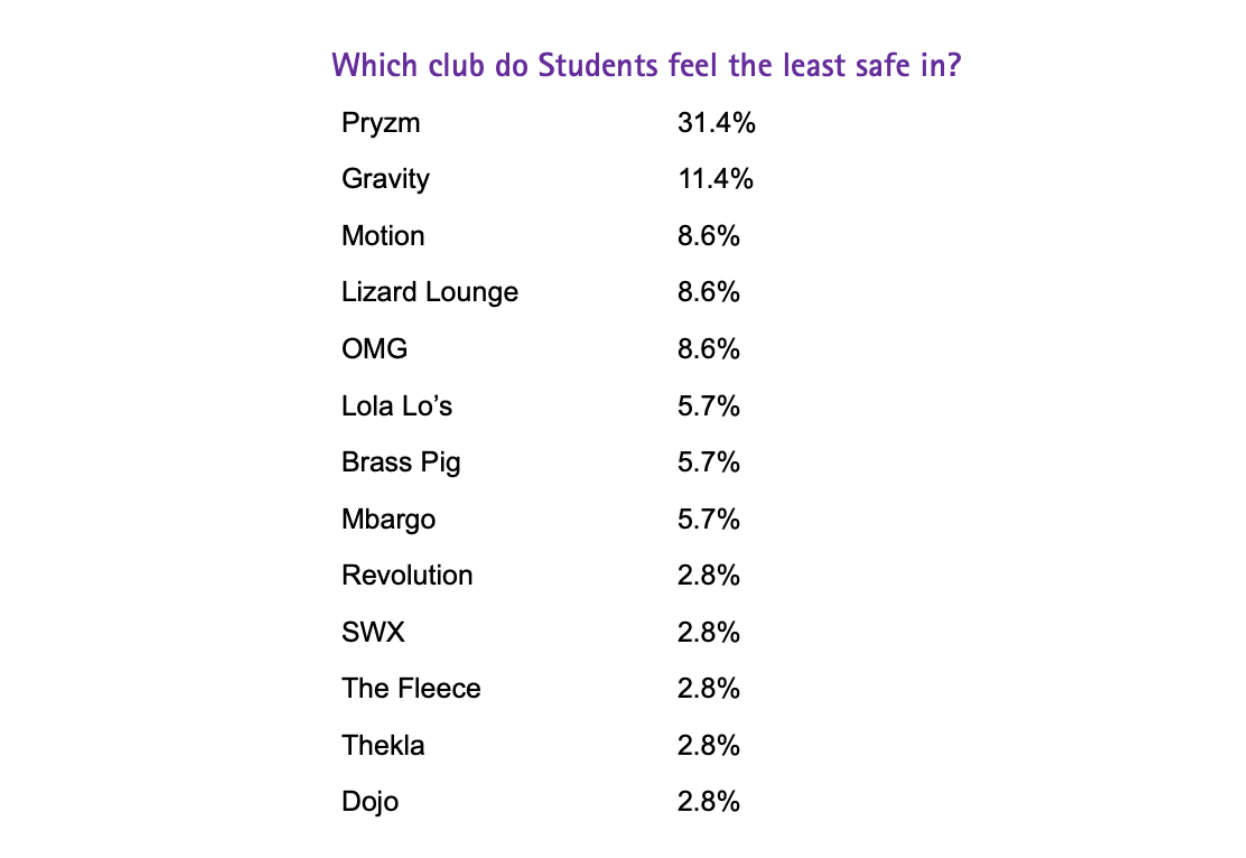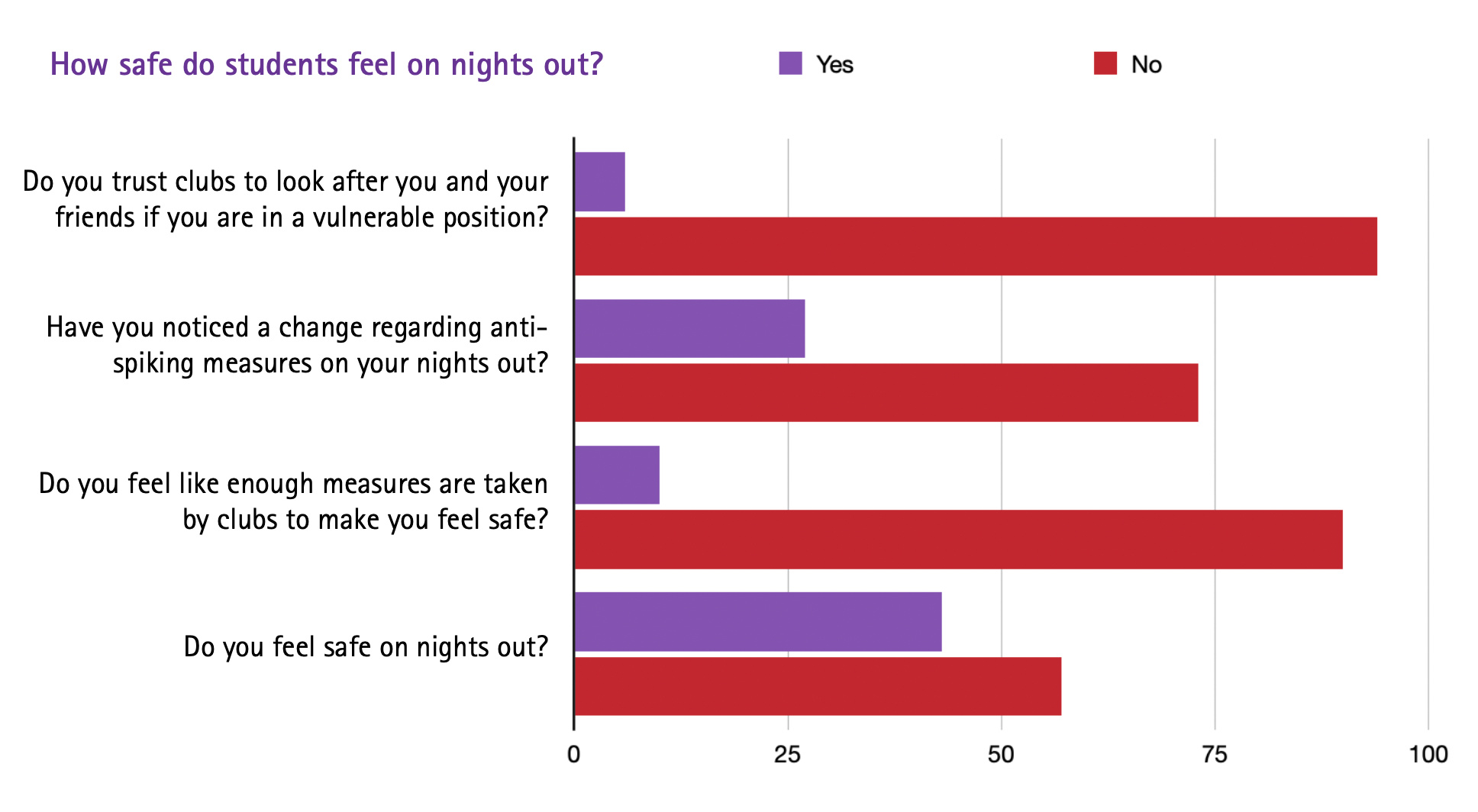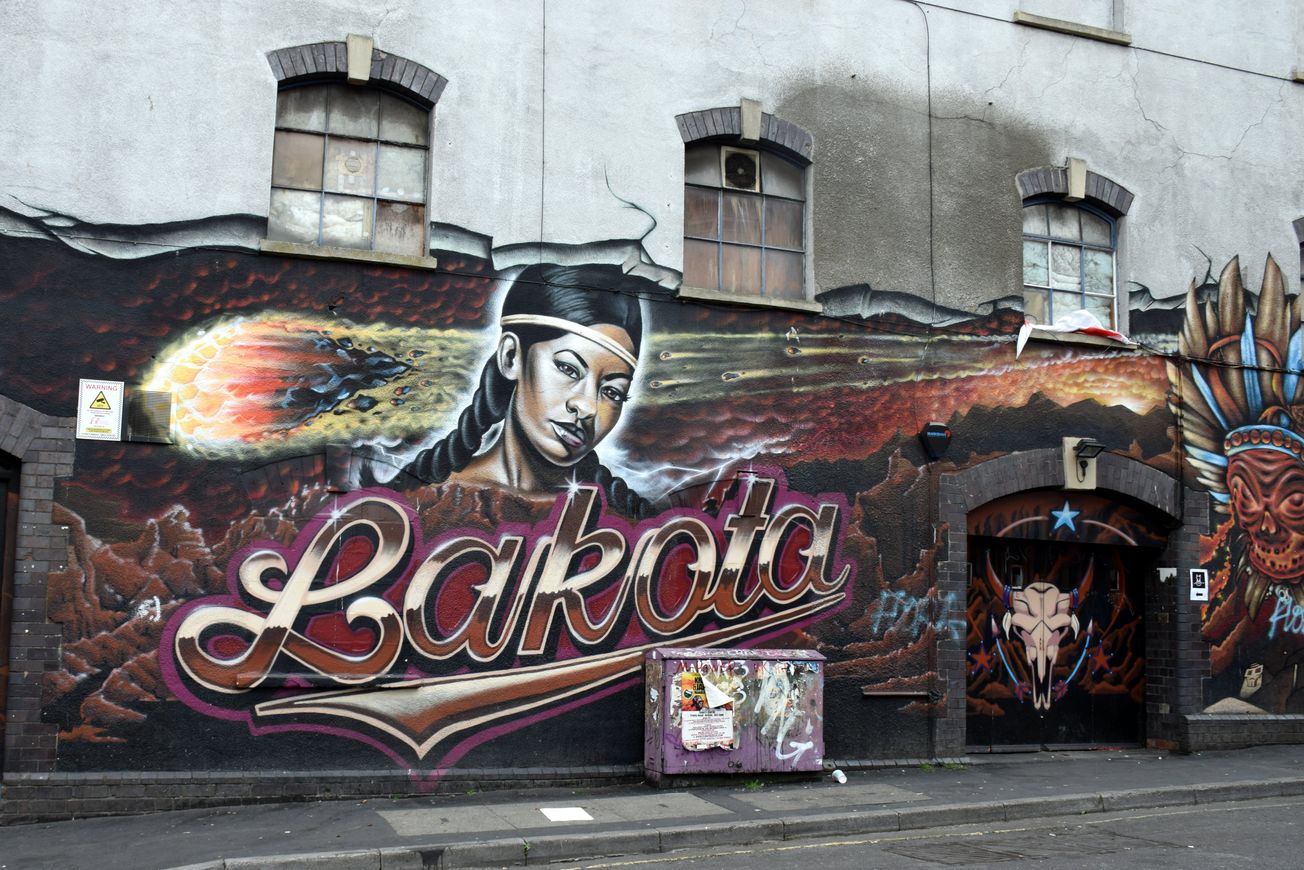By Marine Saint, Deputy Editor and Features Columnist

*This article covers themes of spiking and harassment.
A year has passed since the spiking spate in Bristol, where a viral video of a drink being spiked in Pryzm launched an outburst of night-time safety campaigns across the city as more cases of harassment and harmful club experiences came to light. This initial reaction culminated in ‘Girls Night In’, a boycott and closure of clubs across the UK in a staggered response during the end of October last year.
Since then, there have been multiple new and rebranded policies introduced in Bristol’s bars and clubs, such as the Ask for Angela campaign, where you can discreetly seek help from venue staff if you find yourself in a vulnerable or potentially harmful position. Significant research has also taken place as part of the Erase the Grey and Never Have I Ever campaigns, examining the approaches towards gender-based violence, consent and harassment in student communities.
Help catch spikers = safer nights out. Here are a few bits of advice on how you can be a part of the solution.
— Bristol City Centre BID (@BristolBID) October 14, 2022
ℹ️ Resources and support for spiking victims are available here: https://t.co/9glYCXJhuW #Bristol #UWE #UOB pic.twitter.com/OqjvnF73RK
Why is it then, that students still feel unsafe? Epigram spoke to students to understand their perceptions of these projects and if they feel as though there has been an impactful shift in the culture of Bristol’s nightlife. Whilst these dangers are taken seriously by clubs and officials, cases still appear, and fears of spiking, harassment, and unwanted attention have shaped university nightlife experiences for many.
The incentive for student safety has been reflected in the city’s night-time economy, Bristol City Council, Bristol University, and the SU’s reactions and initiatives which have developed over the past year to ensure students feel safer. Epigram asked representatives from these institutions if real change has been made and what the practical implications of these campaigns have been.
One of the most recent safety initiatives introduced in Bristol is a collaboration between the universities, the police force, Bristol City Council and Bristol City Centre BID. To raise awareness among students, a series of films and posters have been commissioned to offer advice regarding drug and alcohol harm reduction, drink spiking, and nightlife safety. The videos, available on the BID’s website and YouTube channel, aim to educate students about taking care of themselves and others when in Bristol, and include advice from both officials and students.

Vicky Lee, Head of Bristol City Centre BID, stressed the promise of this new collaboration, especially the series of films, ‘to send a message to new residents to our city about how to look after themselves and each other’. According to Lee, the inclusion of the Police and students displays ‘a united message as a night-time community to make people feel welcome and highlight where to turn for help’.
This particular campaign launch coincided with Freshers’ Week, to welcome new and returning students to Bristol and promote the collaborative steps being taken towards safety. Izzy Russell, Bristol SU Student Living Officer, noted how Bristol SU has been working tirelessly to ensure there are safety measures and resources in University bars, such as testing kits, drink toppers, and staff training in the Ask for Angela scheme.
The need for an open discourse between students and professionals and a renewal of trust in nightlife security subsists
Russell commented on the integration of Bristol’s previous campaigns such as Bristol Rules into the SU’s night-time safety ethos: ‘We've continued to work closely with Carly Heath, Bristol's Night-time Economy Adviser, to ensure our work is connected to what’s happening across the city. We had Welcome Angels at each of our nights to support students and provided free buses for safe transport to and from our Welcome club nights’.
The SU has provided a clear statement of their stance on spiking: ‘Drink spiking is a criminal offence carrying a sentence of up to 10 years in prison’.
‘Bristol SU takes all allegations of drink spiking extremely seriously and any student found to be spiking people’s drinks will be reported to both the University and the police. Drinks toppers and test kits are available behind the bar at all Bristol SU club night venues’.
Coming along to one of our club nights next week? Here's some more information about how we are keeping you safe and getting you there and back! 😇 pic.twitter.com/NkFIKfMCkv
— Bristol SU (@Bristol_SU) September 16, 2022
Bristol City Centre BID’s latest student safety campaign continues the work of Bristol Nights, the City Council’s campaign offering support on how to safely enjoy Bristol’s vibrant nightlife. This includes re-distributing the Bristol Rules billboards and posters, some of which can be found across campus.
In a statement made to Epigram, Councillor Ellie King, Cabinet Member for Public Health, Communities and Bristol One City, emphasised the push towards informing students about night-time safety and highlighting the training processes organisations are required to undergo to respond to incidents or offer help. King emphasised the initial goal of the campaign: ‘If we can prevent one student from becoming a victim of crime, then we have made a difference’.
Many students, however, feel that the focus on advising students how to stay safe, rather than re-educating those perpetrating crimes and harassment or allowing such events to go unpunished, is a flaw in the council’s response. Epigram investigated two case studies of students’ experiences, which provided insight into some of the University community’s current views on official stances on this topic.
When posed with the question: Is Bristol now safer at night? Epigram found that the personal experiences shared in anonymous interviews were synonymous with the overwhelmingly dissatisfied view from students towards safety in Bristol’s clubs and bars.
'I wish I knew the answer to what more could be done, but all I know is that I’m always scared'
The first student interviewed explained that they felt a need to remain aware of themselves and others in drinking environments, even within a large group setting, and felt that the safety measures imposed in Bristol’s nightlife have been a short-term solution in line with social media campaigns, rather than a practical change.
Even with successful club boycotts like ‘Girls Night In’, the first interviewee saw no real changes in attitudes towards night-time safety from the clubs and bars themselves. They told Epigram ‘I thought this was over, but it’s still happening to freshers now. We are aware of this, but they may not be.
How did students at Bristol University respond to the spiking crisis in Bristol nightclubs? Bristol ‘Girls Night In’ had them boycott Bristol nightclubs on one of the busiest nights of the week. Take a look at our video to find out more. https://t.co/CnGaa4V0SH pic.twitter.com/C2LUs7DVI8
— UBTV (@UBTVstation) March 30, 2022
‘As a society, we’ve come to terms with the fact that we might get spiked; we shouldn’t have to accept that. In terms of safety in clubs, the behaviour of staff often disrupts a night out—their training hasn’t been extended enough and what we still see is a desire to preserve reputation and stop fights or prevent the use of drugs’.
When asked what they thought should be done to combat this issue, the student highlighted the need for re-education and a better understanding of consent. ‘Perpetrators do not understand consent, so have resorted to spiking or making unwanted approaches.
‘The way forward is to tackle the root problem rather than seeking temporary measures. Drink covers, for example, tell you that people can be spiked, but we should try and stop it earlier. There is an overlap between consent and nightlife culture that people still do not seem to understand or educate others about'.
'The disregard shown towards spiked girls at clubs is criminal'
The second student interviewed by Epigram detailed their experience of clubbing during the spiking spate: ‘There were some security checks at clubs at the height of the spiking but it wasn’t enough to stop determined individuals. I appreciate services like Nightline who are doing an excellent job, but feel like it’s an education we’re lacking rather than preventative measures’.
Student safety at night in Bristol was, again, an issue which they believed remains unresolved. One would expect to observe a feeling of change amongst students, but the need for an open discourse between students and professionals and a renewal of trust in nightlife security subsists: ‘There’s a lot of talk about improving it but the disregard shown towards spiked girls at clubs is criminal.
‘I think I’d want people there to help, people stationed near clubs I can go to for help. People that I know I can trust and won’t be able to get away with abusing their power. I wish I knew the answer to what more could be done, but all I know is that I’m always scared’.
Both students stipulated the various precautions they take when going out at night in the city, including the use of location tracking services and having a direct point of contact if walking home alone. The requirement for improved security does not end with the measures in clubs, it is evident that city-wide campaigns such as Bristol Nights are a valid contribution to the night-time economy.
Epigram reached out to a number of clubs in Bristol and received a comment from La Rocca, one of the Clifton Triangle clubs popular amongst students. For the majority of clubs approached, including Lakota, Thekla, and Pryzm (the location of last year’s viral spiking video), information regarding their spiking and security policies is available via their websites.
La Rocca’s Director, Andy, highlighted the safeguarding searches on entry and anti-spiking devices as effective deterrents for potential perpetrators. Although the impression from the student body is that bouncers at clubs do not always help to create a safe environment, La Rocca underlined that their staff is trained to detect suspicious behaviour and provide support for victims. They take such cases very seriously and use both CCTV and bodycams to maintain security on their premises.
Epigram conducted a survey via Instagram gaging student views on the current safety precautions offered in clubs, which also presented contrasting views to the Council and BID’s approaches. We asked our readers which clubs they feel the least safe in, the results of which are depicted below.

Students were also asked a series of questions in the form of polls. The results, displayed below, indicate that whilst the divide between students feeling safe or not is balanced, their views regarding behaviour and club policies are less aligned with the stances of officials and University campaigns.

Girls Night In campaign launched to spread awareness for the increase in spiking victims
Bristol's nightlife scene unpacked: spiking spate and street (un)safety
Similar data collections have been made with the aims of re-education and addressing student experiences, such as the SU’s No Means No: Consent Culture and Sexual Harrassment research project. The immediate impact of safety measures and initiatives indicates that this is a pressing issue which is actively being engaged with by policymakers and nightlife providers. Nonetheless, in order for the onus to be placed on perpetrator culpability and re-education, a change of mindset is necessary to allow students’ experiences to influence policies and nightlife culture.
Featured Image: Flickr / Nick Kelly
How safe do you feel on nights out in Bristol?






